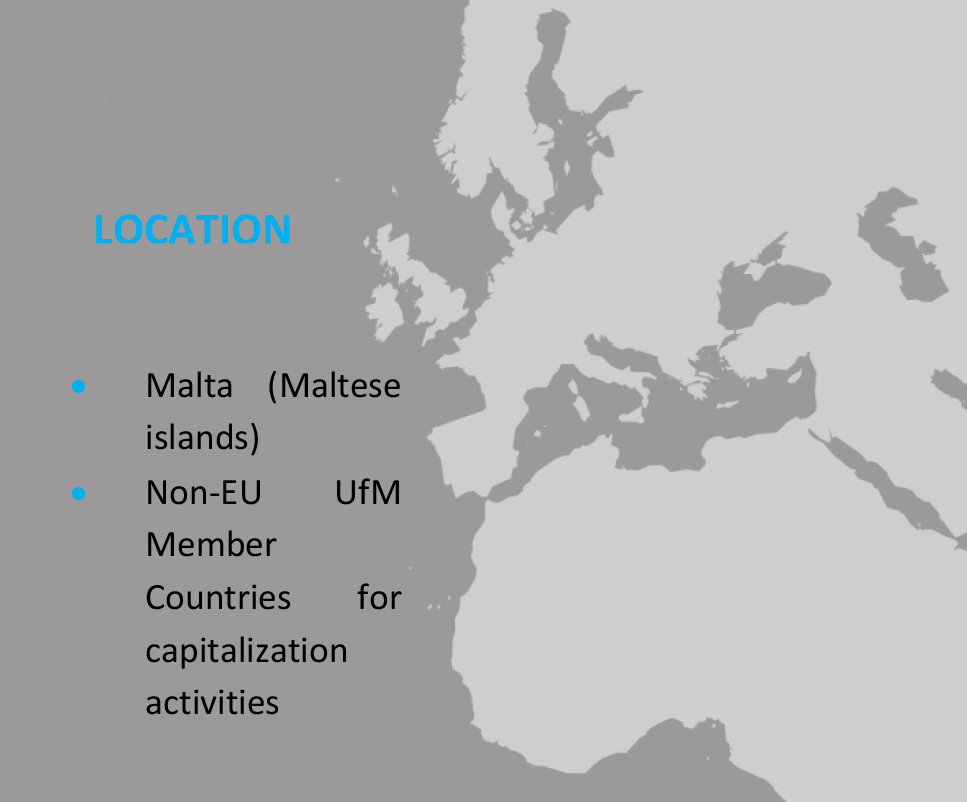
LIFE Integrated Project: Optimising the implementation of the 2nd RBMP in the Malta River Basin District
Context and objectives
The main aim of the LIFE-IP RBMP-MALTA project is to support the implementation of the second River Basin Management Plan (RBMP) through the establishment of an integrated framework for the optimised management of all water resources on the Maltese islands. To achieve this, it will address key identified challenges through the implementation of best practice, demonstration, pilot study, and capacity-building actions.
The LIFE Integrated Project (IP) is planned to be implemented over the whole of the Malta River Basin District (RBD). Malta faces challenges such as water scarcity and drought conditions, high population density, saline intrusion, contamination, and vulnerability of the coastal waters. Pilot actions include demonstration sites for wastewater reuse, and managed aquifer recharge systems in the local water management context. These management practices will be tested through pilot sites established under LIFE IP actions and then replicated on a national level through the utilisation of EU Cohesion Funds CF and European Agricultural Fund for Rural Development (EAFRD) funded measures under the 2nd RBMP.
The objectives of the project are to increase the awareness of the need to conserve and protect water resources and dependent terrestrial, aquatic and marine ecosystems; to facilitate the uptake of measures to build up the confidence of stakeholders and water users in the solutions proposed; to improve the institutional approach to measure implementation, achieving a high level of institutional and stakeholder dialogue; to reduce uncertainty in water body status assessments through improved knowledge of water-related processes, ecosystems and ecosystem services, as well as on interactions with anthropogenic activity, with a view to inform appropriate ecosystem-based management regimes and increase the trust of stakeholders in the status assessments.
It is expected that there will be a reduction of domestic water demand by around 5%, thereby generating annual savings of around 850 000m3 in the municipal water supply. Moreover, a net increase in the mean annual recharge of around 1.2 million m3, coming from alternative water sources such as rainwater runoff and highly-cleaned treated effluents is targeted together with the increased capacity of wastewater treatment plants to produce highly-cleaned water and increased use of this treated wastewater (instead of groundwater), the reduction of flood risk and an improved groundwater status but also to increase awareness on the challenges facing the water sector and to optimised management of coastal ecosystems.
Location

Key figures
Duration:
96 months
Total cost:
€17m
Annual water savings:
850 000m3
Financial contribution
60% EC LIFE financial contribution
Promoter
The Energy and Water Agency of Malta (EWA) is a government agency whose main functions include the formulation, evaluation, monitoring and implementation of national policies concerning the use of energy and water in sustainable manner, the preparation and update of plans to meet National and EU energy and water resources management targets, and the implementation of projects conductive to the achievement of such targets through energy efficiency initiatives, renewable energy penetration and water conservation measures. The EWA took over the role of policy agency from the Malta Resources Authority (MRA) following an administrative reform undertaken by the Maltese Government aimed at separating policy and regulatory functions in different public agencies.
Key partners
Beneficiaries
• Maltese national and local Authorities; Maltese private sector;
• Maltese Academia;
• Maltese users associations;
• Non-EU UfM Member Countries administrations interested.
Key actions
Implementation of the second River Basin Management Plan (RBMP) through the establishment of an integrated framework for the optimised management of all water resources on the Maltese islands.
Assessment of impacts: related to the exploitation of deep saline aquifer systems, desalination plant discharges on coastal waters, use of the subsurface for heating/cooling purposes.
Seek to address the key horizontal challenges identified during a gap analysis, through the implementation of best practice, demonstration, pilot study, and capacity-building actions.
Specific studies and pilot initiatives aimed at the investigation of innovative water management
aspects, with the aim of addressing technical capacity building for enabling the future regulation of these emerging challenges.
Expected Results
Domestic water demand reduced by around 5%, thereby generating annual savings of around 850,000m3 in the municipal water supply.
A net increase in the mean annual recharge of around 1.2 million m3, coming from alternative
water sources such as rainwater runoff and highly cleaned treated effluents.
Increased capacity of wastewater treatment plants to produce highly cleaned water and increased use of this treated wastewater (instead of groundwater).
Reduced flood risk and improved groundwater status.
Increased awareness on the challenges facing the water sector.
Optimised management of coastal ecosystems.
